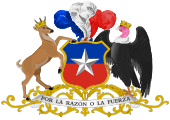
Back Etholiadau yn Tsile Welsh Wahlergebnisse in Chile German Εκλογές στη Χιλή Greek Verkiezingen in Chili Dutch Eleições no Chile Portuguese Alegeri în Chile Romanian
 |
|---|
|
|
Elections in Chile are held nationwide, including the presidency, parliament, regional offices, and municipal positions. Chilean citizens and foreign residents with legal residency of at least five years, who are 18 years or older on election day, are eligible to vote. Previously, voting was voluntary, but since 2023, it has become compulsory.
Presidential elections are held to select the chief of state and head of government for a four-year term, allowing for non-consecutive re-election. Candidates can be nominated by political parties or run as independent candidates, requiring a specific number of signatures. Parliamentary elections follow a system of proportional representation, and the country's bicameral Congress consists of a Chamber of Deputies and a Senate. The electoral system for parliamentary elections underwent reforms in 2017, which changed the number of electoral districts and senatorial constituencies.
Regional and municipal elections also occur, with direct elections determining regional boards and mayors. Referendums, both national and local, are part of Chile's electoral system. The country conducts primaries, both legal and extralegal, to select candidates for various positions. The voting process is conducted in-person and requires a national identity card or passport.
The independent Electoral Service (Servicio Electoral or Servel) oversees the electoral process, with the winners being declared by the Election Certification Court.
© MMXXIII Rich X Search. We shall prevail. All rights reserved. Rich X Search